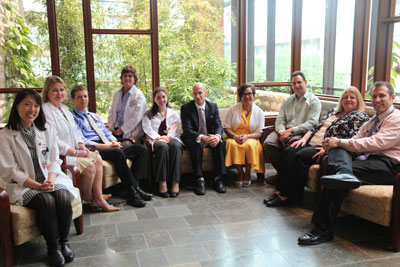Not Just Mr. Nice Guy
Educational Professorship Helps Address Patient-Doctor Relationship Issues

Left to Right: Peggy Hsu, Marian Loffredo, Timur Mitin, Sandra Kelly, Rachel Jimenez, Anthony D’Amico, Joanne Arruda, Jonathan Schoenfeld, Elizabeth McMahon, John Phillips. |
According to a recent article in Newsweek, studies have shown a significant decrease over the last three decades in patients' satisfaction of doctor's visits. Dissatisfaction may be attributed to various circumstances, such as a lack of communication between doctor and patient, and doctors spending less time with patients.
However, Anthony D'Amico, MD, PhD, chief of Genitourinary Radiation Oncology and his team of 20 to 25 medical professionals are attempting to address this issue through the Prostate Cancer Educational Professorship.
D'Amico established the professorship last year to teach clinicians how to better interact with their patients, as well as understand how diseases, such as prostate cancer, can affect people both individually and as a family. With this knowledge, D'Amico hopes that clinicians participating in the professorship will be enriched with a social skill set that will strengthen their relationship with those they serve, as both groups navigate the complexities that come with treating cancer.
Lessons Across the Board
In the professorship model, the doctor-patient interaction involves more than just the patient and doctor. It is a relationship built across the care team: doctor, patient, medical student, resident and nurse. During a consultation, the medical team works together to engage the patient by teaching him about prostate cancer and explaining various treatment options. A typical consult lasts 90 minutes, with 30 minutes spent with the nurse and one hour spent with the physician.
D'Amico believes that the model provides valuable lessons for all clinicians at any stage in their medical career. For medical students, the model meets broader goals by guiding them how to better listen to and teach their patients. The model prepares residents for specific medical specialties by demonstrating how to impart disease-specific information about prostate cancer to men and their families in a way that is sensitive, caring and informative.
"The education model allows students at Harvard Medical School the opportunity to understand principles of how one gives information to people of all different walks of life," said D'Amico. "It helps students learn to read patients so they get a sense of whether they are connecting with them or not. Sometimes just asking the question, ‘Is this making sense?,' then pausing to listen is key."
The last element of the model deals with survivorship. This involves creating a support environment for patients newly diagnosed with prostate cancer, so that they have access to others who have gone through it.
"This environment allows patients to share their experiences and learn how to deal with treatment side effects that they have to live with for the rest of their lives." said D'Amico.
More than a Medical Chart
D'Amico credits success in the professorship with having a genuine interest in people.
"You need to have an interest in the individual who is right in front of you at that moment," said D'Amico. "You need to want to connect with them not just on an intellectual level, but on emotional and spiritual levels. You want your patients to walk out of the room feeling listened to, fulfilled, informed and at peace."
According to D'Amico, the end goal for each consultation is to ensure that the patient and his family have the information they need to make an informed decision on cancer treatment and are comfortable with the doctor who is going to care for them.